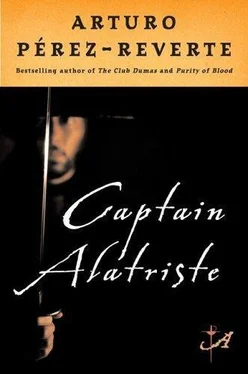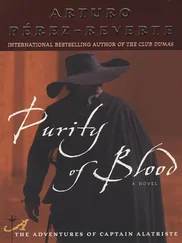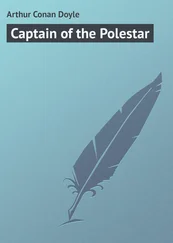Arturo Perez-Reverte - Captain Alatriste
Здесь есть возможность читать онлайн «Arturo Perez-Reverte - Captain Alatriste» весь текст электронной книги совершенно бесплатно (целиком полную версию без сокращений). В некоторых случаях можно слушать аудио, скачать через торрент в формате fb2 и присутствует краткое содержание. Жанр: Старинная литература, на английском языке. Описание произведения, (предисловие) а так же отзывы посетителей доступны на портале библиотеки ЛибКат.
- Название:Captain Alatriste
- Автор:
- Жанр:
- Год:неизвестен
- ISBN:нет данных
- Рейтинг книги:3 / 5. Голосов: 1
-
Избранное:Добавить в избранное
- Отзывы:
-
Ваша оценка:
- 60
- 1
- 2
- 3
- 4
- 5
Captain Alatriste: краткое содержание, описание и аннотация
Предлагаем к чтению аннотацию, описание, краткое содержание или предисловие (зависит от того, что написал сам автор книги «Captain Alatriste»). Если вы не нашли необходимую информацию о книге — напишите в комментариях, мы постараемся отыскать её.
Captain Alatriste — читать онлайн бесплатно полную книгу (весь текст) целиком
Ниже представлен текст книги, разбитый по страницам. Система сохранения места последней прочитанной страницы, позволяет с удобством читать онлайн бесплатно книгу «Captain Alatriste», без необходимости каждый раз заново искать на чём Вы остановились. Поставьте закладку, и сможете в любой момент перейти на страницу, на которой закончили чтение.
Интервал:
Закладка:
That morning, however, something altered the routine. Instead of passing the tavern and continuing up the street, allowing me the usual fleeting vision of its blonde passenger, the carriage stopped just before it reached me, some twenty steps from the Tavern of the Turk. The mud had pasted a large sliver from a barrel stave onto one of the spokes, and it had worked its way into the axle, jamming the wheel. The coachman had no choice but to stop the mules and slip down to the ground, or mud, to be exact, to free the wheel. It happened that the group of boys who were always hanging about on that corner gathered closer to jeer at the coachman, and he, annoyed, took up his whip to run them off. He never accomplished it. The street urchins of Madrid then were as pesky and persistent as a swarm of bot flies— In any quarrel, the one born in Madrid wins the laurel, goes an old saying—and besides, it was not every day that they were offered a diversion like a carriage on which to practice their aim. And so, armed with clumps of mud, they began to exhibit a skill with their projectiles that the most experienced harque-busier would have envied.
I jumped up, alarmed. The fate of the coachman was of no consequence to me, but the carriage was transporting something that at that stage in my young life was the most precious cargo imaginable. Besides, was I not the son of Lope Balboa, a man who died gloriously in the wars of our lord and king? So I had no choice. Resolved to do battle immediately for someone I considered my lady—always from afar and with the greatest respect—I charged the young hellions, and with two blows of my fists and four stout kicks sent the enemy forces flying, leaving me champion of the field.
The direction of my attack—in line with my secret desire, it must be told—had brought me close to the carriage. The coachman was not a grateful type, so after giving me a surly look, he returned to his work. I was just about to leave, when those blue eyes appeared at the window. The vision froze me where I stood, and I felt blood rush to my face with the speed of a musket ball. The girl, the young lady, focused on me with an intensity that could have stopped the flow of water in the nearby fountain. Blonde. Pale. Painfully beautiful. Why I am telling you this? She did not even smile, she merely stared at me with curiosity. It was obvious that my gesture had not gone unnoticed. As for me, that look, that apparition, more than compensated for my trouble. I lifted my hand to an imaginary hat and bowed.
"Inigo Balboa, at your s-service," I stammered, although managing to give my words a certain firmness I judged to be gallant. "Page in the service of Captain Don Diego Alatriste."
The girl held my gaze, never changing expression. The coachman had climbed onto his mule and slapped the reins, and the carriage began to roll. I took one step back to avoid being spattered by the wheels, and at that instant she again placed a small, perfect, white-as-mother-of-pearl hand on the edge of the window frame, and I felt as if I had been given it to kiss. Then the corners of her mouth, perfectly sketched on pale lips, lifted slightly, nothing more than a flicker that could be interpreted as a distant, enigmatic, and mysterious smile. I heard the coachman's whip crack, and the carriage jerked away, carrying with it that smile which I still today cannot swear was real or imagined. And I was left standing in the middle of the street, enslaved by love, watching that girl who to me was a blonde angel. Poor fool that I was, oblivious of the fact that I had just met my sweetest, most dangerous, and mortal enemy.
IV. THE AMBUSH
In March it grew dark early. There were streaks of light in the sky, but beneath the eaves of the roof tiles the streets were black as a wolf's mouth. Captain Alatriste and his companion had chosen a narrow, lonely lane that the two Englishmen would have to follow on the way to the House of Seven Chimneys. A messenger had advised them of the hour and the route. He had also brought the most recent description of their victims, to prevent error. Mister Thomas Smith, the blonder and older of the two, was riding a dapple-gray horse and wearing a gray travel suit with discreet silver adornments, high boots also dyed gray, and a hat with a band of the same color. As for Mister John Smith, the younger man, he was riding a bay. His suit was chestnut brown, his boots saddle-colored, and his hat sported three small white plumes. After several days of riding, both were looking dusty and fatigued. They had little luggage: two portmanteaus strapped onto the croups of their mounts.
Hidden in the shadow of an arched entry, Diego Alatriste looked toward the lantern that he and his companion had placed at a bend in the street so that it would throw light on the travelers before they could see their attackers. The lane, which turned at a sharp right angle, began at Calle Barquillo, near the palace of the Conde de Guadalmedina and, after skimming the orchard wall of the Discalced Carmelite convent, ended at the House of Seven Chimneys, near the crossing of Calle Torres and Las Infantas. The place chosen for the ambush was in the first section, which had the darkest and tightest turn, where two horsemen taken by surprise could easily be overcome.
It grew a little cooler, and the captain wrapped himself more tightly in his new cape, bought with the advance, in gold, from the masked men. As he moved, the clink of metal was audible: the vizcaina ticked the hilt of the sword and the grip of the loaded and well-oiled pistol thrust in the back of his belt. It might be necessary, in the worst case, to resort to such a noisy and definitive expedient, something expressly forbidden for pragmatic reasons but in difficult situations an opportune solution. That night, Alatriste had rounded out his attire with a buffalo-hide jerkin that would protect his body from an antagonist's knife, and his own slaughterer's blade hidden in the leg of one of his old boots, the ones with comfortable and well-worn soles that would give him good footing once the dance began.
"Oh unlucky the madman
Who unbuckles his sword ..."
Alatriste began to recite to himself, to make the time pass. He murmured a few more fragments from Lope de Vega's The Sheep Well, one of his favorite dramas, before he again fell silent, his face hidden beneath the wide brim of his hat, which he had pulled down to his eyebrows.
Another shadow moved slightly, a few steps from where he was standing beneath the arch of the gate that led to the garden of the Carmelite priests. After a long half-hour of immobility, the Italian must have been as cold and stiff as the captain was. The Italian was a strange one. He had come to the rendezvous dressed in black, wrapped in his black cape and wearing a black hat, and his pockmarked face had brightened with a smile only when Alatriste suggested they set the lantern where it would light the bend of the lane they had chosen for the ambush.
"I like that," was all the Italian said, in that choked, harsh voice. "They will be in the light and we in the shadow. Seen and unseen."
Then he had whistled the little phrase he seemed so fond of, ti-ri-tu, ta-ta, while in an expeditious, professional tone they planned the assault. Alatriste would take on the older of the two men, the gray-suited Englishman riding the dapple-gray, while the Italian would dispatch the man in brown riding the bay. No pistol shots, if possible, for everything should happen with enough stealth that when the job was done they could search the luggage, find the documents, and, of course, relieve the cold meat of the money they were carrying. If there was an uproar that attracted witnesses, it would blow the whole plan to hell. In addition, the House of Seven Chimneys was not far away, and the servants of the English ambassador might come to the aid of their compatriots. What was needed, therefore, was a quick and deadly operation: cling, clang-, greetings and godspeed. And their English starlings would be halfway to Hell, or wherever Anglican heretics ended up. At least those two were not going to yell at the top of their lungs for confession, as good Catholics did, waking half of Madrid.
Читать дальшеИнтервал:
Закладка:
Похожие книги на «Captain Alatriste»
Представляем Вашему вниманию похожие книги на «Captain Alatriste» списком для выбора. Мы отобрали схожую по названию и смыслу литературу в надежде предоставить читателям больше вариантов отыскать новые, интересные, ещё непрочитанные произведения.
Обсуждение, отзывы о книге «Captain Alatriste» и просто собственные мнения читателей. Оставьте ваши комментарии, напишите, что Вы думаете о произведении, его смысле или главных героях. Укажите что конкретно понравилось, а что нет, и почему Вы так считаете.










